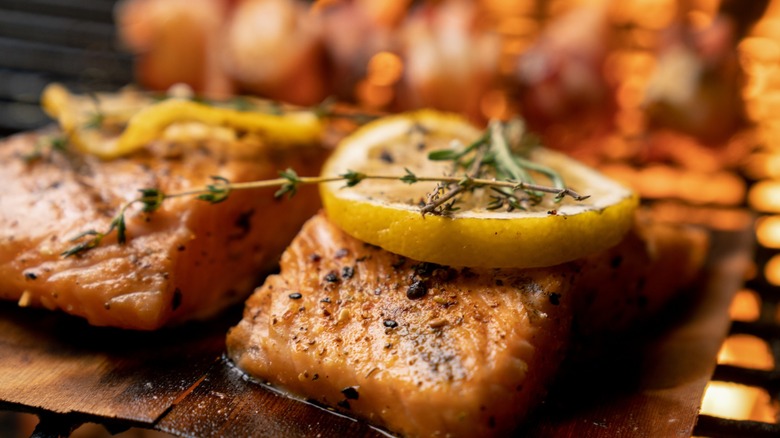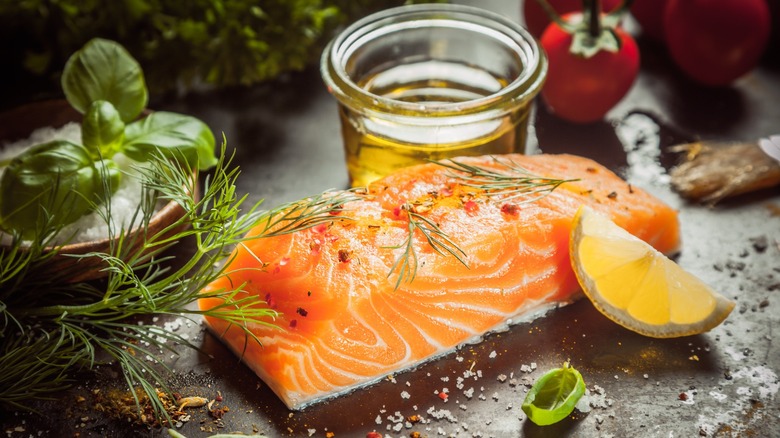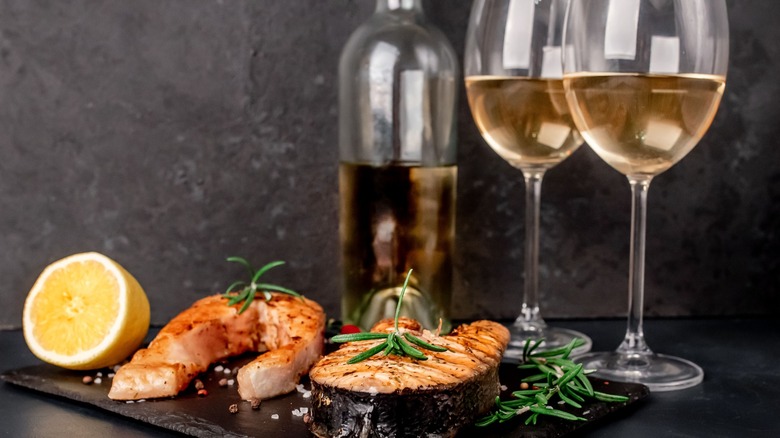The Marinade Mistake That Leaves Salmon Mushy
Salmon is a pretty ubiquitous yet alluring food, so much so that there's an entire guide to buying and cooking this dense, dark pink fish. And while there's no shortage of methods for preparing salmon — whether it's smoking it, curing it, or leaving the salmon filets whole on a cedar grilling plank — marinating is an excellent first step to inject some extra flavors into whatever salmon-based dish you're making. But this tip comes with a word of caution, as applying a marinade to salmon can potentially ruin the texture of the fish.
Using a marinade on salmon is a wonderful idea, just so long as you use it carefully and pay attention to how long the salmon sits in it. Many marinades, such as the effortless Italian Salmoriglio, use an acidic component to help tenderize your meat or fish. Usually, this is something like citrus juice or vinegar. While this can lend a really nice zing to your salmon, it can also make it far too mushy, as the acid will change the salmon on a chemical level. So to be on the safe side, it's recommended to marinate your salmon for no more than 20 or 30 minutes.
Acid cooks salmon without cooking it
The acid component of your marinade makes your salmon mushy through a chemical process called denaturation, which is also why heating food (or cooking food) changes it. The denaturation process can therefore be broken down into culinary subcategories of heat denaturation and acid denaturation, both of which transform salmon by breaking down the hydrogen atoms within its proteins. This breakdown results in a looser, more tender piece of fish, but too much of it can break down the proteins to the point where your salmon can barely hold itself together.
This process might ring a bell for you if you're familiar with the ins and outs of ceviche, an age-old Peruvian dish and arguably the textbook example of acid denaturation done right. In this case, lime juice usually fills the acid role, virtually "cooking" the fish (which, really, is only marinating) before it's drained to avoid more denaturation than is necessary. The result? Morsels of fish or shellfish that are technically raw, but have a look and texture as if they've been cooked. But just like salmon, you have to ensure that your ceviche doesn't sit in its acidic bath for too long.
Find the best marinade for your salmon
So, you now know to keep a close eye on how long to let your salmon sit if you're using an acidic marinade. But what kinds of marinades are best to use for salmon? Are there any "rules" when it comes to choosing ingredients? As with most cooking tips, there are a few routes you can take.
Fish tends to have a milder flavor than other meat dishes, and as such, you can really ramp up the overall dish by incorporating ingredients with strong flavors. Since salmon is adaptable to other flavors, it acts as a relatively blank canvas for your culinary adventures. This is why acidic ingredients like vinegar or citrus juice can work well, but it doesn't stop there. Fresh garlic is a wonderful ingredient for a salmon marinade. It's best to chop or mince it so that the garlic can impart its oil and flavor all over the salmon.
Additionally, using a sweet component such as brown sugar or maple syrup is recommended for salmon, not only because it can offset any salt you add, but also because the sugar will caramelize while cooking. This helps to create a crust on the salmon for a beautiful textural component. Generally speaking, it's worth experimenting with a marinade that uses an acid, a sugar, some salt, and your favorite herbs and spices — just make sure that the salmon doesn't sit in the marinade overnight.


